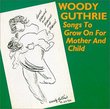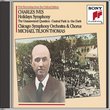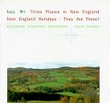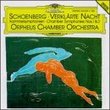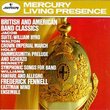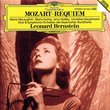| All Artists: Arnold Schoenberg, Herbert von Karajan, Berlin Philharmonic Orchestra Title: Schoenberg: Verklärte Nacht, Pelleas und Melisande / Karajan, Berlin Philharmonic Orchestra Members Wishing: 0 Total Copies: 0 Label: Deutsche Grammophon Release Date: 3/17/1998 Genre: Classical Styles: Forms & Genres, Theatrical, Incidental & Program Music, Historical Periods, Modern, 20th, & 21st Century, Symphonies Number of Discs: 1 SwapaCD Credits: 1 UPC: 028945772127 |
Search - Arnold Schoenberg, Herbert von Karajan, Berlin Philharmonic Orchestra :: Schoenberg: Verklärte Nacht, Pelleas und Melisande / Karajan, Berlin Philharmonic Orchestra
CD DetailsSimilarly Requested CDs |
CD ReviewsHighly Recommended James Stevenson | Baltimore, MD USA | 08/14/2000 (4 out of 5 stars) "This is probably the definitive interpretation of these two early Schoenberg works, which along with his Gurrelieder, form a sort of triumvirate of pre-atonal and pre-serialist Schoenberg. As far as Verklärte Nacht, it has never seemed (to me) to be Schoenberg at his best. It has undeniable power, but I've never thought it measured up to the next work on the disc. Pelleas und Melisande--now this is an amazing work. Composer Jonathan Harvey summed it up perfectly: "tonal music at the peak of its expressive intensity." This, along with Webern's Passacaglia has always seemed to be a sort of "last will and testament" of romanticism and expressionism. After this what more is there to say about or in that great tonal tradition? Evidently very little according to Schoenberg--his first total break with tonality, Erwartung, came just six years later . Pelleas is quite breathtaking, even harrowing, and the finale is wonderfully serene and undeniably quite haunting. Karajan brings an appropriate restraint to the drama--which can go too far if left unchecked and there are some wonderful details I hadn't heard in other performances of this work. This is definitely a virtuoso work, but Karajan and Berlin handle it marvelously. Verklärte Nacht, originally written for string sextet and revised for string orchestra in 1943 is handled well throughout, although I can't help feeling as though everything gets a bit mushy at times. I had the opportunity to listen to the LP from 1974 and was able to compare it side by side with this CD transfer. The results are good and the CD suffers little or no loss in quality. Great recording of a superb work." Ravishing playing and recording of two voluptuous pieces!! Alexander Z. Damyanovich | Flesherton, Ontario, Canada | 01/04/2002 (5 out of 5 stars) "Here is a recording that ought to win any and all waverers who might initially be discouraged by the reputation or the music of the mature Schoenberg. [Only those who are utterly bigoted against him or whose sophistication and taste are relatively lightweight are likely to resist this music and recording.] This is due both the the sumptuous sonorities and playing of the Berliner Philharmoniker as well as to the recording itself (though it's a pity that DGG didn't dare use the CEDAR de-hissing technology that Decca/London has been doing, including Solti's recording of Richard Strauss's "Elektra" - it would have helped even better!). This recording in particular was the one that opened my eyes to the beauties of the symphonic poem equivalent of the Debussy opera on the same subject. In this incarnation, "Pelléas und Mélisande" can already be seen as a step leading away from the openly-Romantic feeling of "Verklärte Nacht" and "Gurrelieder", with the dissonances becoming more powerful, the horizontal quasi-contrapuntistic thinking and the orchestral sonorities of later works coming into brighter focus (already noticeable in the opening 4-6 pages of the orchestral score). It therefore already serves as a good bridge between his earlier output and his even more radical 1st Chamber Symphony while still plainly indicating how much of a Romantic Schoenberg remained at heart and would remain so. This is an absolute 5 stars and more!" I can't believe it's Schoenberg! AMAZING! Joey Joe Joe Jr. Shabadoo | Boston, MA USA | 10/28/2005 (5 out of 5 stars) "I have always been wary of Schoenberg, and the Serialists in general. While I believe that Serialism - the idea that none of the twelve notes of the chromatic scale are more important than the others and thus should all be incorporated into a work - is a fascinating intellectual excercise, I find myself unable to digest the resultant noise and dissonance when said excercise is actually realized.
A little background on my musical tastes for those who also fear the Serialists: I love most classical music, from the Rennaissance works of Dufay, de Machaut, etc., to Baroque (Bach, Handel, Corelli, Scarlatti, Telemann, Vivaldi) to Classical (Mozart, Haydn, Boccherini) to Romantic (Beethoven, Schumann, Mendelssohn, Dvorak, Brahms, Tchaikovsky, Schubert, Saint-Saens et al) to the post-Romantics (Bruckner, Sibelius, Strauss, Franck) to the Impressionists (Ravel, Debussy) and even some more tonal 20th century composers (late Prokofiev, early Shostakovich, Hindemith). However, an invisible line is drawn for me when it comes to Serialism. With all that said, if you enjoy all or some of the above, then this disc should not be missed. Schoenberg's two earliest orchestral works, paired on this CD, are a far cry from Schoenberg's later works. They are most definitely in the post-Romantic mold. The first work, Verklarte Nacht, is a true masterwork, scored both for string sextet and massive string orchestra (the latter is represented on this disc). Here, Karajan brings a Straussian feel to the work, which seems fitting considering the opulent thematic density presented. The Berlin Philharmonic was at its zenith at the time of this recording, and let me tell you, it shows. The recording is sumptuous as well. Simply a gorgeous work that is a must have, as it represents Schoenberg's farewell to tonality, almost a summation of all that came before him. The same can be said of Pelleas und Mellisande, which is scored for full orchestra and offers another outstanding example of Schoenberg's style, manifested in a tonal way. So I say this to those who fear the names "Berg", "Webern", and "Schoenberg" as I do - you should STILL pick up this CD. The sound is incredible, the run-time is 70+ minutes, and the performances are definitive. And if you are more in tune with chamber music dynamics, verklarte nacht was also scored for string sextet by the composer. If you get that version, try to find it paired with Strauss's Capriccio introduction for string sextet, and his Metamorphosen, scored for string septet." |

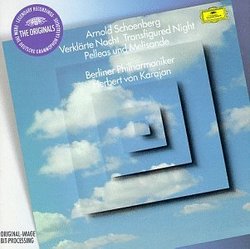
 Track Listings (16) - Disc #1
Track Listings (16) - Disc #1